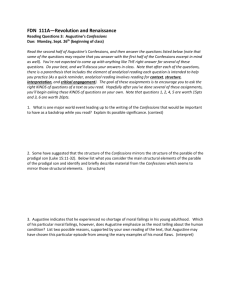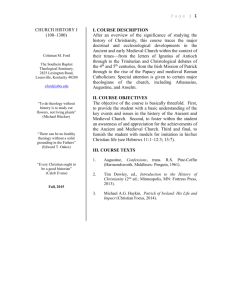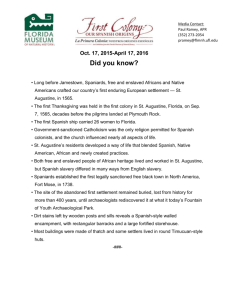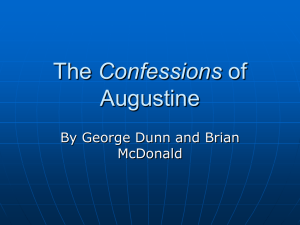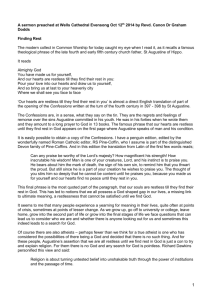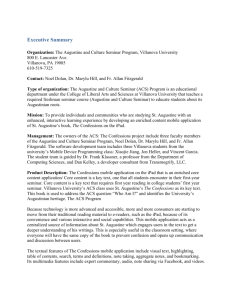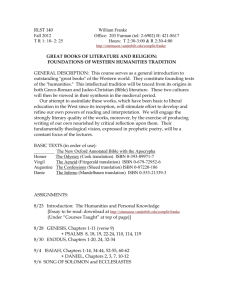If this course is being submitted for approval as a new
advertisement
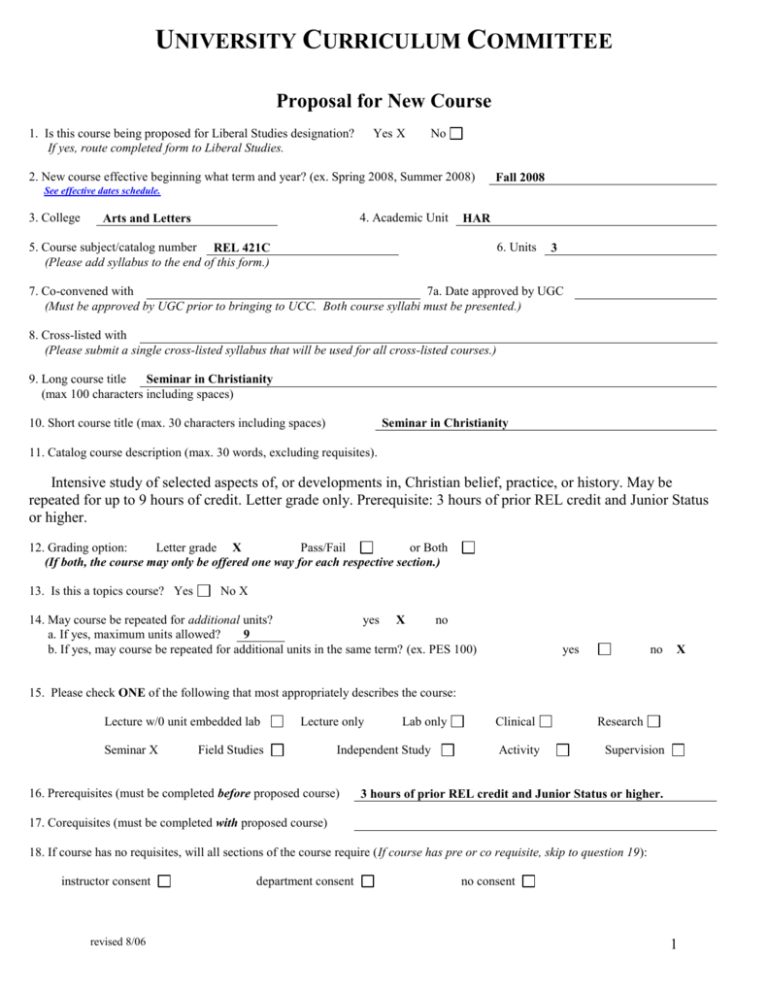
UNIVERSITY CURRICULUM COMMITTEE Proposal for New Course 1. Is this course being proposed for Liberal Studies designation? If yes, route completed form to Liberal Studies. Yes X No 2. New course effective beginning what term and year? (ex. Spring 2008, Summer 2008) Fall 2008 See effective dates schedule. 3. College 4. Academic Unit Arts and Letters HAR 5. Course subject/catalog number REL 421C (Please add syllabus to the end of this form.) 6. Units 3 7. Co-convened with 7a. Date approved by UGC (Must be approved by UGC prior to bringing to UCC. Both course syllabi must be presented.) 8. Cross-listed with (Please submit a single cross-listed syllabus that will be used for all cross-listed courses.) 9. Long course title Seminar in Christianity (max 100 characters including spaces) 10. Short course title (max. 30 characters including spaces) Seminar in Christianity 11. Catalog course description (max. 30 words, excluding requisites). Intensive study of selected aspects of, or developments in, Christian belief, practice, or history. May be repeated for up to 9 hours of credit. Letter grade only. Prerequisite: 3 hours of prior REL credit and Junior Status or higher. 12. Grading option: Letter grade X Pass/Fail or Both (If both, the course may only be offered one way for each respective section.) 13. Is this a topics course? Yes No X 14. May course be repeated for additional units? yes X no a. If yes, maximum units allowed? 9 b. If yes, may course be repeated for additional units in the same term? (ex. PES 100) yes no X 15. Please check ONE of the following that most appropriately describes the course: Lecture w/0 unit embedded lab Seminar X Lecture only Field Studies Lab only Independent Study 16. Prerequisites (must be completed before proposed course) Clinical Activity Research Supervision 3 hours of prior REL credit and Junior Status or higher. 17. Corequisites (must be completed with proposed course) 18. If course has no requisites, will all sections of the course require (If course has pre or co requisite, skip to question 19): instructor consent revised 8/06 department consent no consent 1 19. Is the course needed for a plan of study (major, minor, certificate)? yes X Name of new plan? Note: A new plan or plan change form must be submitted with this request. no 20. Does course duplicate content of existing courses within or outside of your college? yes no X If yes, list any courses this course may have duplicative material with and estimate percentage of duplication: Please attach letters of support from each department whose course is listed above. 21. Will this course affect other academic plans, academic units, or enrollment? yes If yes, explain in justification and provide supporting documentation from the affected departments. 22. Is a potential equivalent course offered at a community college (lower division only)? If yes, does it require listing in the Course Equivalency Guide? yes Please list, if known, the institution, subject/catalog number of the course. yes no X no no 23. Justification for new course, including unique features if applicable. Please indicate how past assessments of student learning prompted proposed changes. (Attach proposed syllabus in the approved university format). As part of a major curriculum restructuring being undertaken by the NAU Religious Studies program, all existing 400-level courses are being deleted and replaced with a new structure of capstone experience options intended to refine essential skills for future learning, and to engage majors (and minors) in culminative work in the program. Through the intensive study of a particular theme, movement, significant figure, or phenomenon related to the specific religious tradition, students will participate in the production and communication of new knowledge and/or understanding in a seminar experience comparable to graduate studies in the field. 24. Names of current faculty qualified to teach this course Jason BeDuhn, Arne Hassing 25. If course will require additional faculty, space, or equipment, how will these requirements be satisfied? 26. Will present library holdings support this course? yes revised 8/06 X no 2 If the course being submitted for approval is NOT a LIBERAL STUDIES course, please go to step 41. LIBERAL STUDIES ONLY Contact name: Arne Hassing Contact email: Arne.Hassing@nau.edu Dept. Chair name: Curtis Hinsley Dept. Chair email: Curtis.Hinnsley@nau.edu College Contact name : Jean Boreen 27. This course is a College Contact email: Jean.Boreen@nau.edu X Single section Multi-section 28. List names of faculty who may teach this course: Jason BeDuhn, Arne Hassing 29. Section enrollment cap: 15 If this course is being submitted for approval as a new LIBERAL STUDIES course, please complete questions 30-32. OR If this course is being submitted for approval as a new JUNIOR LEVEL WRITING course, please complete questions 36-37. OR If this course is being submitted for approval as a new SENIOR CAPSTONE course, please complete questions 38-40. NEW LIBERAL STUDIES COURSE 30. Distribution Block (check one): If a topics course, must apply to ALL sections. Aesthetic and Humanistic Inquiry Cultural Understanding Science Social and Political Worlds 31. Skills (check two): If a topics course, must apply to ALL sections. Effective Oral Communication Quantitative Reasoning Effective Writing Critical Thinking Scientific Reasoning 32. Is this a topics course? Yes No If YES, please complete questions 34-36. If NO, please go to question 42. TOPICS COURSE ONLY 33. Identify the Student Learning Outcomes that will be found in ALL topic syllabi offered under this course number. 34. Explain by what method(s) Student Learning Outcomes will be assessed in ALL topic syllabi offered under this course number. 35. Please attach an example of a Topic Syllabus offered under this course number. GO TO question 41 NEW JUNIOR LEVEL WRITING COURSE (refer to question 19) 36. To which degree programs offered by your department/academic unit does this proposal apply? 37. Do you intend to offer ABC 300 and ABC 300W? yes revised 8/06 no 3 If no, please submit a course delete form for the ABC 300. GO TO question 41 NEW SENIOR CAPSTONE COURSE (refer to question 19) 38. To which degree programs offered by your department/academic unit does this proposal apply? REL 37. Does this proposal replace or modify an existing course or experience? yes X If yes, which course(s)? REL 490, REL 470 no 40. Do you intend to offer ABC 400 and ABC 400C? yes no X If no, please submit a course delete form for the ABC 400. 41. Approvals Department Chair (if appropriate) Date Chair of college curriculum committee Date Dean of college Date For Committees use only For Liberal Studies Committee Date Action taken: _____________________ Approved as submitted For University Curriculum Committee ___________________________ Approved as modified Date Action taken: Approved as submitted revised 8/06 Approved as modified 4 College of Arts and Letters Department of Humanities, Arts, and Religion REL 421C:Seminar in Christianity AUGUSTINE’S CONVERSIONS Spring, 2009 M 3 - 5:30 Professor: Jason BeDuhn, Ph.D. Office: Riles 107 Office hours: MW 3:30-4:30 3 credit hours Phone: 523-8892 e-mail: jason.beduhn@nau.edu Course Description Augustine of Hippo, “the second founder of the faith,” is one of the most pivotal figures in Christian history, essential to both the Catholic and Protestant traditions of Western Christianity. This course is designed to trace his evolution as a thinker, a leader, and as a self over the course of half a century. Our guide for much of this exploration will be his own autobiographical Confessions. Through its narrative, we will trace Augustine’s north African origins, his early education and life, and his first “conversion,” to the intellectual pursuit of truth, at the age of 19. We will then follow him into the religious community where he thought the pursuit of truth could best be pursued: the Manichaean Church. We will examine its appeal for and influence on Augustine, and seek to understand why he ultimately abandoned the Manichaean faith. We will then chart his second “conversion,” to Platonism and Catholicism, in his early thirties. We will grapple with the discrepancies between the account he gives in the Confessions and the evidence of his writings from the time of his conversion. We will consider the character of “conversion,” and the process of self-reconstruction that follows such a decision. Through the first two decades of his own writings, he will watch the development of his thought, his response to the ever-present Manichaean alternative, and his emerging role as a leader of African Catholicism. This path will finally lead us back to the Confessions to see it as it really is: not an account of Augustine’s self as it was in the times described in the narrative, but a constructed past fitted to his self as it finally shaped itself at the time of writing the Confessions. Augustine described himself as someone who evolves in the act of writing, and we will explore how that can be seen in his case, and what it means for the fluidity and constructedness of human selfhood. In the process of this exploration, the course offers a thorough examination of key issues in religious thought: the nature of God, the problem of evil, the issue of free will and grace, ethical foundations, the status and interpretation of sacred scripture, the respective roles of belief and practice, and the character of conversion. Course Objectives In the process of participating in this course, students will have an opportunity to develop, and to demonstrate ability in, critical reading and critical thinking in response to some of the foundational theological literature of the Western Christian tradition. By approaching the writings of Augustine in the context of alternatives to his positions, the student will be able to assess strengths and weaknesses in those positions, and consider the consequences of Augustine’s intellectual choices for Christian belief and practice. As outcomes of active participation in this course, students will (1) be able to identify major themes and core issues in Christian theology (critical reading), to reflect sufficiently on their own distance from the world of the text to formulate questions of revised 8/06 5 understanding (critical thinking), and to communicate their insights and questions in a clear and concise manner (effective writing and effective oral communication); (2) be able to express their own reactions to ideas and arguments of early Christian leaders, and reflect upon the factors of distance (in time, circumstance, culture, social norms, even physics) that produce varying degrees of comfort or discomfort with the material (basic to cultural understanding); (3) be able to demonstrate a grasp of basic concepts, and facility with basic tools, in religious studies (knowledge of the field); (4) be able to identify issues in the academic field of religious studies (critical reading), compare and assess proposals and arguments of interpretation (critical thinking), and effectively communicate the process and conclusions of their own investigations (effective writing); Course Format The course will be conducted in a seminar format, requiring in-depth preparation and full, active participation in every class session. In a seminar, the professor and students are partners in an intellectual investigation where new insights are to be expected from the confluence of their different perspectives on the course material. Required Texts Augustine, The Confessions (Penguin, 1961). Augustine, Earlier Writings (Westminster/John Knox, 1979). Augustine, Writings against the Manichaeans and Donatists (NPNF 1.4) (Eerdmans). E. Stump & N. Kretzmann, Cambridge Companion to Augustine (Cambridge, 2001). Phillip Cary, Augustine’s Invention of the Inner Self (Oxford, 2000) A. D. Nock, Conversion (Johns Hopkins, 1998) [ON RESERVE: Augustine, Against the Academics (Paulist, 1978)] Class Calendar UNIT 1: BACKGROUND AND CONTEXT OF AUGUSTINE’S CONVERSIONS Week One -- Jan 18 Wednesday Introduction to the course Week Two -- Jan 23 Conversion in the Ancient World: Nock, 1-271 Week Three -- Jan 30 Coexistence and Competition among the Religions of North Africa; the Circumstances of the Confessions Augustine – Growing Up: Confessions 1-2; Companion, 8-25 UNIT 2: AUGUSTINE THE MANICHAEAN Week Four -- Feb 6 The First Conversion and the Attractions of Manichaeism: Confessions 3 revised 8/06 6 Augustine’s Manichaeism: Confessions 4; Morals of the Manichaeans 10-20 Week Five -- Feb 13 Faustus: Confessions 5; Against Faustus (selections) Scepticism and Spiritual Exile: Confessions 6 Week Six -- Feb 20 Milan: Platonism & Catholicism: Confessions 7; Cary 9-44 essay 1 due; discussion Week Seven -- Feb 27 Overcoming Scepticism: Against the Academics; Companion, 159-170 Conversion: Confessions 8; Morals of the Catholic Church 31-35, Companion 171-185 UNIT 4: AUGUSTINE – PHILOSOPHER AND MISSIONARY Week Eight -- Mar 6 A New God – A New Man?: The Good Life, Confessions 9; Companion 71-90; Cary 45-60 Mapping the Soul: Soliloquies; Cary 63-104 Week Nine -- Mar 13 Explaining Evil: On Free Will (books 1 & 2); On the Morals of the Manichaeans 1-9; Companion 40-48, 124-147; Cary 105-114 What makes a religion work?: On True Religion; On the Morals of the Catholic Church 1-30 SPRING BREAK: Mar 20-24 Week Ten -- Mar 27 The place of faith: The Usefulness of Belief; Companion, 26-39 essay 2 due; discussion Week Eleven -- Apr 3 Self-unity & self-responsibility: On the Two Souls; Companion 116-123 The unexpected challenge: Against Fortunatus UNIT 5: INVENTING THE INNER SELF Week Twelve -- Apr 10 Exegesis: Against the Fundamental Epistle; Confessions 11-13; Against Faustus (selections); Companion, 59-70, 103-115 The Plot Thickens: On Free Will (Book 3); Cary 115-124; To Simplician Week Thirteen -- Apr 17 How One Becomes What One Is: The Constructedness of the Confessions The Remembered Self: Confessions 10, Companion 148-158; Cary 125-139 Week Fourteen -- Apr 24 The Divided Self: Companion 205-233; Cary 140-145 The Consequences of Augustinianism Week Fifteen -- May 1 Research Presentations revised 8/06 7 Wednesday, May 10: Research Papers Due Evaluation of Student Performance 1. An “empathy-experiment”essay assessing the strengths and weaknesses of Manichaeism as a religious system in the ancient world, showing facility with religious studies concepts, categories, and modes of analysis: 200 points. 2. A “critical analysis” essay on the question of Augustine’s conversion – from what, to what? – showing close reading and avoidance of anachronism and teleological constructs of history: 200 points. 3. A research paper on a topic chosen by the student in consultation with the professor: 400 points. 4. Discussion leadership, assessed for preparation, organization, clarity, and facilitation of discussion: 200 points. Your final grade in the course will be determined according to the following point scale: 900-1000 =A 800-899 =B 700-799 =C 600-699 =D 599 and below = F revised 8/06 8
